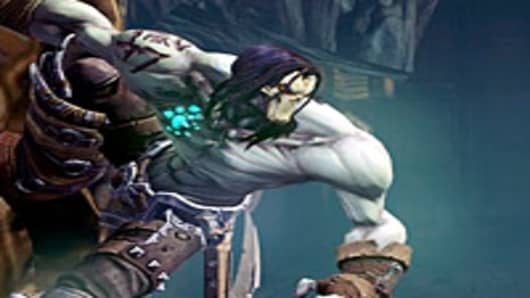Five years ago THQ was one of the videogame industry's biggest publishers. Today, the company is struggling to stay afloat.
The troubled game maker is facing a possible delisting from the Nasdaq stock exchange, announced the layoff of 240 employees Wednesday and slashed its CEO's salary in half for the next year as sales have plummeted. Further, last week the company announced plans to abandon the once lucrative children's licensed games business to focus on titles for a core audience.
It's a turbulent period of change for THQ and while Wall Street analysts aren't yet cutting their ratings, they're showing signs of skepticism about the company's future.
"We believe THQ continues to lack a critical mass of high quality games with multi-million unit sales status and has yet to show any ability to execute this console cycle," says Eric Handler of MKM Partners. "While we recognize the need to get smaller before growing again, we lack conviction in when (or if) that upturn may come."
THQ president and CEO Brian Farrell will be taking a 50 percent cut to his base salary, from $718,500 to $359,250, for a one-year period beginning February 13, 2012. Additionally, Farrell agreed to reduce the payment he will receive if he resigns or is terminated without cause to one-third of the previous amount.
The company hopes its restructuring, which it plans to detail on its earnings call with analysts Thursday, will help reverse its fortunes. This, however, is hardly the company's first effort to turn things around.
In 2008, for example, the company shut down 5 studios and cut 250 jobs, saying it had a new goal of "fewer, higher quality titles".
A year later, it said it planned to shift its aim away from the children's games it was best known for to focus on core gamers.
"We know how to do this," said CEO Brian Farrell at the time.
Months later, however, THQ signed a licensing deal with Dreamworks for a series of titles that failed to connect with the mass market audience.
And as recently as last August, the company reduced its headcount by 200 people and shut down two studios as part of a plan to once again move away from licensed games and focus on properties it owned. The language was similar (though less direct) to what the company announced last week. (At the time, THQ said it was "reducing" the number of licensed kids' games. The January restructuring did away with them altogether.)
Licensed games, historically, were one of the easiest ways to have a reliable stream of income. And THQ made a fortune through titles based on SpongeBob and anything attached to a Pixar release. That gravy train dried up, though — a victim of poor production quality and the explosion of dirt-cheap kids games on mobile devices.
The loss of that income has hit the company's stock hard. It's been under the $1 mark since December 8, 2011 (which led to the delisting warning) — and hasn't seen the the north side of $5 per share since March 2011. (Five years ago, shares were trading in the $34 range.)
The loss of income from kids' games certainly plays into that, but investors are also tired of the company's string of core titles that have shown initial promise, but fallen flat when they hit retail — games like "Red Faction," "Homefront" and "UFC Undisputed".
The most recent flop has been "uDraw". In early December, THQ lowered its Q3 revenue guidance nearly 25 percent due to weak sales of the drawing tablet and its related games for Microsoft's Xbox 360 and Sony'sPlayStation 3. That same game had been a success for the company on the Nintendo Wii.
The lack of a breakaway hit has led to plenty of skepticism about THQ's future. Michael Pachter of Wedbush Securities, in December, wrote he believed "THQ is at risk of running out of cash by the June 2012 quarter" after the company's reduced guidance.
"With another unprofitable year expected in FY:12 (its fourth unprofitable year in the last five years), we expect the company’s cash balance to become an issue if it is unable to turn a profit in the first half of FY:13," he said. "Given its declining licensed and core properties (apart from 'Saints Row'), and an uncertain release schedule next year, we remain unconvinced that FY:13 will be profitable."
Questions? Comments? TechCheck@cnbc.com


